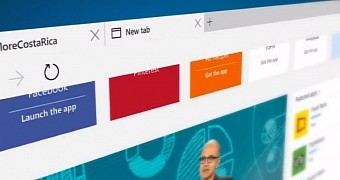Microsoft Edge is the name of the new browser that will soon see daylight in Windows 10, and the Redmond-based tech giant is working to make it more secure, faster, and available across all devices, thus addressing the criticism launched against Internet Explorer for so many years.
In a blog post today, Microsoft details the security enhancements available in Edge, pointing out that most of the changes it came up with for the new browser make it much more secure than Internet Explorer.
It’s no secret that Internet Explorer has always been criticized for its poor security system, so with Edge, Microsoft is trying to tackle this problem more effectively and make sure that users consider it at least as good as Chrome and Firefox.
In addition to features that are also available in Windows 10 and try to replace passwords, such as Microsoft Passport, Edge also includes new technologies to block malicious websites and downloads, fake pages with certificate reputation and “a major overhaul of the DOM representation in the browser’s memory.”
A 64-bit process
Memory corruption would no longer be possible in Microsoft Edge, the software giant guarantees, thanks to new technologies that block exploits aimed at such vulnerabilities, while the extensions that will work in the browser will run in a secure sandbox that won’t allow any attack to get through.
Although it’s designed as a universal app that runs on PCs, phones, and tablets, Microsoft Edge will be launched as a 64-bit application when running on a computer with a 64-bit processor because this way it becomes harder to hack thanks to Windows ASLR (Address Space Layout Randomization).
“Attackers want to inject malicious code into your browser process via a coding bug, and then execute their malicious code. ASLR makes that harder by randomizing the memory layout of the process, making it hard for attackers to hit precise memory locations to achieve their ends. In turn, 64-bit processes make ASLR much more effective by making the address space exponentially larger, making it much more difficult for attackers to find the sensitive memory components they need,” Microsoft explains.
And yes, for those wondering, the bounty program for Microsoft Edge will continue, so those who find bugs in the new browser can submit them to the company and get paid for them. Microsoft is willing to reward you with up to $15,000 (€11,000) if the flaw you come across is critical, so this is your chance to earn some easy money overnight just by looking into Edge code.

 14 DAY TRIAL //
14 DAY TRIAL //